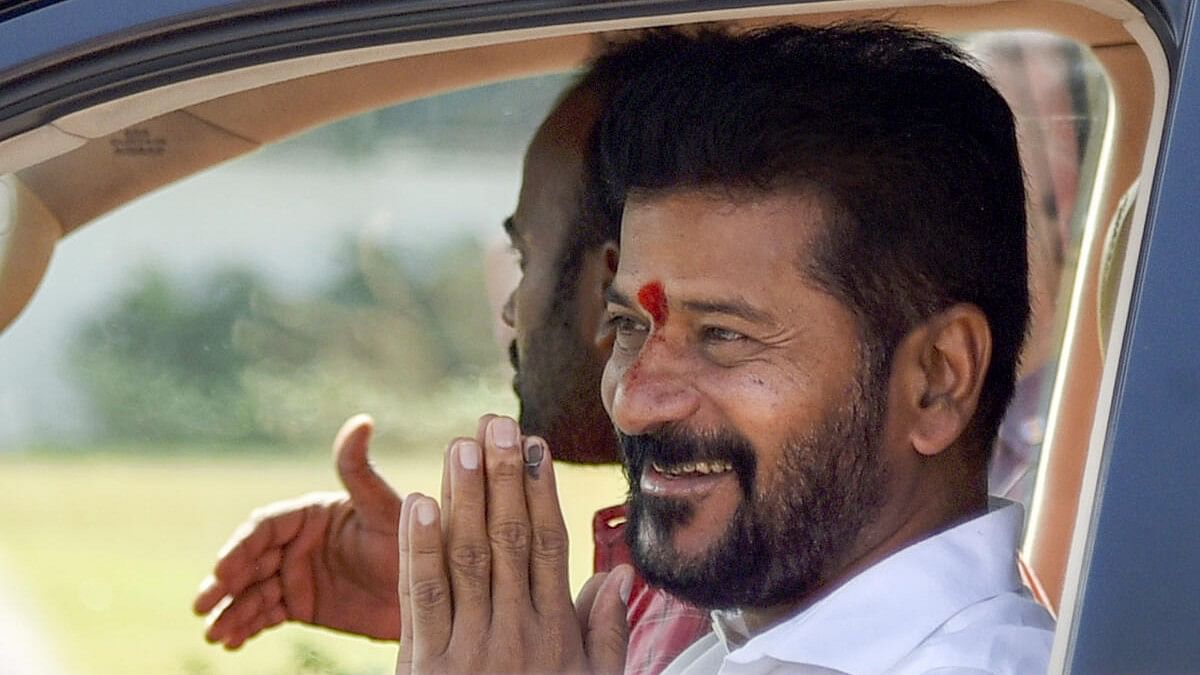
Telangana CM Revanth Reddy.
Credit: PTI Photo
People’s moods are difficult to predict, and things can change dramatically during the election season. The Bharat Jodo Yatra by Congress leader Rahul Gandhi proved to be a game changer in Telangana. Various civil society groups and community organisations also played a major role in the Congress electoral victory in the state. This is also reflected in the voting patterns as reflected in the CSDS study. During the frequent visits to Telangana before the elections, my colleagues and I gauged that the electorate wanted to vote against the ruling Bharat Rashtra Samithi (BRS)’s feudal tendencies.
BRS leader and former Chief Minister K Chandrashekar Rao constructed barricades around his camp office which for many people was reminiscent of a feudal order. According to an RTI reply, the state had spent almost Rs 50 crore to set up the barricades, to prevent ordinary people from accessing their elected representatives. It was emblematic of KCR’s style of KCR’s functioning and the Congress’ ‘PrajaVani’ is a counter to it.
No wonder that newly-elected Chief Minister Revanth Reddy dismantled the barricades and opened the space for the people. The breaking down of the barricades at the camp office, and the job offer letter to a differently-abled person make for good visual optics. The Mahalaxmi scheme offers women and transgender free bus rides. The Arogyasri scheme promises financial protection for the poor to meet their health necessities.
The people are very happy, and the new government is fulfilling its promises. But the honeymoon period is very brief. The Congress needs to keep in mind that the mandate is for more inclusive governance, as promised in its manifesto.
An unemployed youth-turned-cattle herder, Karne Sirisha (Barrelakka) became popular as she embodied the aspirations of the unemployed youth. Since late last year, there have been numerous reports of fee hikes at Osmania University, government exams are being postponed, and recruitments are not taking place on time — in short, the higher education sector is neglected. This neglect of State-run educational institutions directly impacts the marginalised groups (SC/ST/OBCs, including gendered and religious minorities). In a scenario, where public sector employment is shrinking, the State needs to ensure secure employment for the youth in a time-bound manner. Only then will the demographic advantage pay dividends.
The Congress needs to keep in mind that they have won 23 out of the 31 seats reserved for the Schedule Castes and Schedule Tribe. This is a huge opportunity as well as a responsibility to ensure that the promises laid out in the manifesto are fulfilled. The division of erstwhile Andhra Pradesh brought forth different questions for many communities. To illustrate, 26 communities were categorised as backward castes. After the split, in Andhra Pradesh, these 26 communities continue as backward castes, while in Telangana they are considered as general castes. These communities are also fighting for social justice. A caste census would help discern the level of socio-economic mobility of the various communities, and help enhance their opportunities for progress.
The Christians in the state, which earlier supported the BRS, went with the Congress this time based on the basis of supporting a pro-poor, secular, and democratic government. A section of the Muslim voters, however, went with the BRS as it had ensured communal amity. The question to the Congress remains: will communal peace be maintained even after a rise in the BJP’s vote share in Telangana? It was a good strategy by the Congress to appoint AIMIM’s Akbaruddin Owaisi as the pro-tem speaker, but other community groups also need to be accommodated.
In Telangana, there were protests around the Dharani scheme which was introduced to manage land records. However, there were reports that many landless tenants and marginal farmers were negatively impacted by the scheme. Linked to this were the Rythu Bandhu and the promise of electricity. The challenge is to find the loopholes and make the scheme more people-friendly.
Currently, the Cabinet includes different social groups, but further expansion needs to ensure that it does not turn out to be a Reddy-dominated Cabinet. A similar inclusive approach needs to be taken while appointing different nominated positions.
The Congress government in Karnataka has sought to evolve an alternative paradigm of development, balancing welfare schemes with growth. Telangana also needs to fashion a development model which will not neglect the rural areas, but strive for a more holistic growth. This will be possible if partnerships with civil society and community-based organisations are assiduously cultivated.
The next five months will be significant as the Lok Sabha elections are around the corner. The Congress’ performance in Telangana and Karnataka will be scrutinised by the rest of India while making their political choices.
(N Sukumar teaches Political Science at Delhi University.)
Disclaimer: The views expressed above are the author's own. They do not necessarily reflect the views of DH.